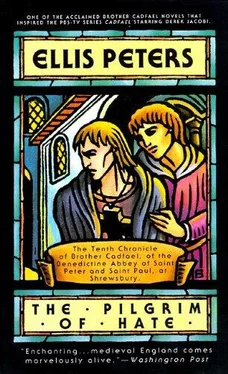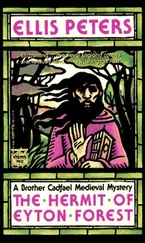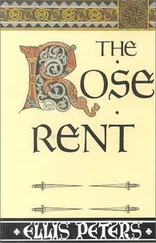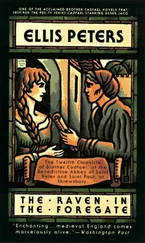Ellis Peters - The Pilgrim of Hate
Здесь есть возможность читать онлайн «Ellis Peters - The Pilgrim of Hate» весь текст электронной книги совершенно бесплатно (целиком полную версию без сокращений). В некоторых случаях можно слушать аудио, скачать через торрент в формате fb2 и присутствует краткое содержание. Жанр: Исторический детектив, на английском языке. Описание произведения, (предисловие) а так же отзывы посетителей доступны на портале библиотеки ЛибКат.
- Название:The Pilgrim of Hate
- Автор:
- Жанр:
- Год:неизвестен
- ISBN:нет данных
- Рейтинг книги:4 / 5. Голосов: 1
-
Избранное:Добавить в избранное
- Отзывы:
-
Ваша оценка:
- 80
- 1
- 2
- 3
- 4
- 5
The Pilgrim of Hate: краткое содержание, описание и аннотация
Предлагаем к чтению аннотацию, описание, краткое содержание или предисловие (зависит от того, что написал сам автор книги «The Pilgrim of Hate»). Если вы не нашли необходимую информацию о книге — напишите в комментариях, мы постараемся отыскать её.
The Pilgrim of Hate — читать онлайн бесплатно полную книгу (весь текст) целиком
Ниже представлен текст книги, разбитый по страницам. Система сохранения места последней прочитанной страницы, позволяет с удобством читать онлайн бесплатно книгу «The Pilgrim of Hate», без необходимости каждый раз заново искать на чём Вы остановились. Поставьте закладку, и сможете в любой момент перейти на страницу, на которой закончили чтение.
Интервал:
Закладка:
“You were orphaned early. How long have you been with your Aunt Weaver?”
“Seven years now,” said Rhun almost drowsily, soothed by the circling fingers. “I know we are a burden to her, but she never says it, nor she would never let any other say it. She has a good business, but small, it provides her needs and keeps two men at work, but she is not rich. Melangell works hard keeping the house and the kitchen, and earns her keep. I have learned to weave, but I am slow at it. I can neither stand for long nor sit for long, I am no profit to her. But she never speaks of it, for all she has an edge to her tongue when she pleases.”
“She would,” agreed Cadfael peacefully. “A woman with many cares is liable to be short in her speech now and again, and no ill meant. She has brought you here for a miracle. You know that? Why else would you all three have walked all this way, measuring out the stages day by day at your pace? And yet I think you have no expectation of grace. Do you not believe Saint Winifred can do wonders?”
“I?” The boy was startled, he opened great eyes clearer than the clear waters Cadfael had navigated long ago, in the eastern fringes of the Midland Sea, over pale and glittering sand. “Oh, you mistake me, I do believe. But why for me? In case like mine we come by our thousands, in worse case by the hundred. How dare I ask to be among the first? Besides, what I have I can bear. There are some who cannot bear what they have. The saint will know where to choose. There is no reason her choice should fall on me.”
“Then why did you consent to come?” Cadfael asked.
Rhun turned his head aside, and eyelids blue-veined like the petals of anemones veiled his eyes. “They wished it, I did what they wanted. And there was Melangell…”
Yes, Melangell who was altogether comely and bright and a charm to the eye, thought Cadfael. Her brother knew her dowryless, and wished her a little of joy and a decent marriage, and there at home, working hard in house and kitchen, and known for a penniless niece, suitors there were none. A venture so far upon the roads, to mingle with so various a company, might bring forth who could tell what chances?
In moving Rhun had plucked at a nerve that gripped and twisted him, he eased himself back against the timber wall with aching care. Cadfael drew up the homespun hose over the boy’s nakedness, knotted him decent, and gently drew down his feet, the sound and the crippled, to the beaten earth floor.
“Come again to me tomorrow, after High Mass, for I think I can help you, if only a little. Now sit until I see if that sister of yours is waiting, and if not, you may rest easy until she comes. And I’ll give you a single draught to take this night when you go to your bed. It will ease your pain and help you to sleep.”
The girl was there, still and solitary against the sun-warmed wall, the brightness of her face clouded over, as though some eager expectation had turned into a grey disappointment; but at the sight of Rhun emerging she rose with a resolute smile for him, and her voice was as gay and heartening as ever as they moved slowly away.
He had an opportunity to study all of them next day at High Mass, when doubtless his mind should have been on higher things, but obstinately would not rise above the quivering crest of Mistress Weaver’s head-cloth, and the curly dark crown of Matthew’s thick crop of hair. Almost all the inhabitants of the guest-halls, the gentles who had separate apartments as well as the male and female pilgrims who shared the two common dortoirs, came in their best to this one office of the day, whatever they did with the rest of it. Mistress Weaver paid devout attention to every word of the office, and several times nudged Melangell sharply in the ribs to recall her to duty, for as often as not her head was turned sidewise, and her gaze directed rather at Matthew than at the altar. No question but her fancy, if not her whole heart, was deeply engaged there. As for Matthew, he stood at Ciaran’s shoulder, always within touch. But twice at least he looked round, and his brooding eyes rested, with no change of countenance, upon Melangell. Yet on the one occasion when their glances met, it was Matthew who turned abruptly away.
That young man, thought Cadfael, aware of the broken encounter of eyes, has a thing to do which no girl must be allowed to hinder or spoil: to get his fellow safely to his journey’s end at Aberdaron.
He was already a celebrated figure in the enclave, this Ciaran. There was nothing secret about him, he spoke freely and humbly of himself. He had been intended for ordination, but had not yet gone beyond the first step as sub-deacon, and had not reached, and now never would reach, the tonsure. Brother Jerome, always a man to insinuate himself as close as might be to any sign of superlative virtue and holiness, had cultivated and questioned him, and freely retailed what he had learned to any of the brothers who would listen. The story of Ciaran’s mortal sickness and penitential pilgrimage home to Aberdaron was known to all. The austerities he practised upon himself made a great impression. Brother Jerome held that the house was honoured in receiving such a man. And indeed that lean, passionate face, burning-eyed beneath the uncropped brown hair, had a vehement force and fervour.
Rhun could not kneel, but stood steady and stoical on his crutches throughout the office, his eyes fixed, wide and bright, upon the altar. In this soft, dim light within, already reflecting from every stone surface the muted brightness of a cloudless day outside, Cadfael saw that the boy was beautiful, the planes of his face as suave and graceful as any girl’s, the curving of his fair hair round ears and cheeks angelically pure and chaste. If the woman with no son of her own doted on him, and was willing to forsake her living for a matter of weeks on the off-chance of a miracle that would heal him, who could wonder at her?
Since both his attention and his eyes were straying, Cadfael gave up the struggle and let them stray at large over all those devout heads, gathered in a close assembly and filling the nave of the church. An important pilgrimage has much of the atmosphere of a public fair about it, and brings along with it all the hangers-on who frequent such occasions, the pickpockets, the plausible salesmen of relics, sweetmeats, remedies, the fortune-tellers, the gamblers, the swindlers and cheats of all kinds. And some of these cultivate the most respectable of appearances, and prefer to work from within the pale rather than set up in the Foregate as at a market. It was always worth running an eye over the ranks within, as Hugh’s sergeants were certainly doing along the ranks without, to mark down probable sources of trouble before ever the trouble began.
This congregation certainly looked precisely what it purported to be. Nevertheless, there were a few there worth a second glance. Three modest, unobtrusive tradesmen who had arrived closely one after another and rapidly and openly made acquaintance, to all appearances until then strangers: Walter Bagot, glover; John Shure, tailor; William Hales, farrier. Small craftsmen making this their summer holiday, and modestly out to enjoy it. And why not? Except that Cadfael had noted the tailor’s hands devoutly folded, and observed that he cultivated the long, well-tended nails of a fairground sharper, hardly suitable for a tailor’s work. He made a mental note of their faces, the glover rounded and glossy, as if oiled with the same dressing he used on his leathers, the tailor lean-jowled and sedate, with lank hair curtaining a lugubrious face, the farrier square, brown and twinkling of eye, the picture of honest good-humour.
They might be what they claimed. They might not. Hugh would be on the watch, so would the careful tavern-keepers of the Foregate and the town, by no means eager to hold their doors open to the fleecers and skinners of their own neighbours and customers.
Читать дальшеИнтервал:
Закладка:
Похожие книги на «The Pilgrim of Hate»
Представляем Вашему вниманию похожие книги на «The Pilgrim of Hate» списком для выбора. Мы отобрали схожую по названию и смыслу литературу в надежде предоставить читателям больше вариантов отыскать новые, интересные, ещё непрочитанные произведения.
Обсуждение, отзывы о книге «The Pilgrim of Hate» и просто собственные мнения читателей. Оставьте ваши комментарии, напишите, что Вы думаете о произведении, его смысле или главных героях. Укажите что конкретно понравилось, а что нет, и почему Вы так считаете.












